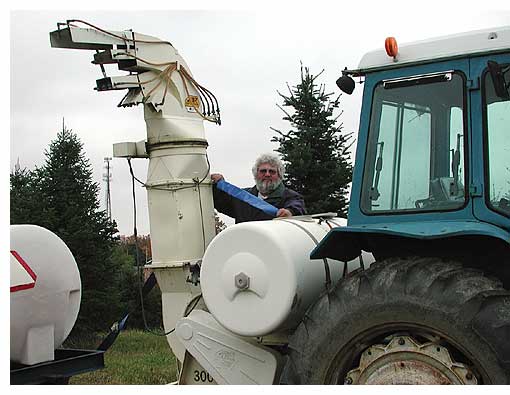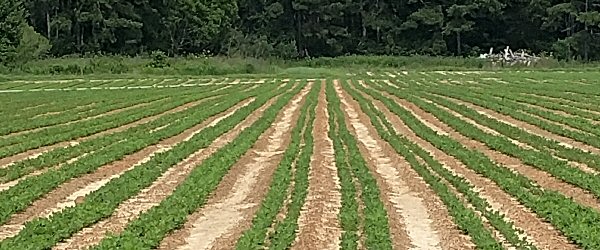Grower strengthens nursery operations with EQIP
by Rebecca Lamb, MSU IPM Program
 Many people think of farming in terms of food and livestock. A quick look outdoors shows us that the landscape and nursery industry is an important part of our economy and environment. Mike Yancho is a nursery grower who realizes how his production practices affect everyone around him and has become involved in the Environmental Quality Incentive Program (EQIP).
Many people think of farming in terms of food and livestock. A quick look outdoors shows us that the landscape and nursery industry is an important part of our economy and environment. Mike Yancho is a nursery grower who realizes how his production practices affect everyone around him and has become involved in the Environmental Quality Incentive Program (EQIP).
Trim Pines Farm is a 100-acre, family-owned business that has been selling locals Christmas trees and evergreens for their landscapes since 1976. Mike Yancho has been running Trim Pines Farm since his father, George Yancho, passed the reins to him. George remains an important part of the business by scouting trees for pests and helping to make decisions regarding integrated pest management.
"We’re a close group of people here. Not only are my son and my daughter with me every day, but I also have a strong emotional attachment to all of my employees’. Even my 5-year-old granddaughter is part of the business. She has her own set of garden tools and her own garden," said Mike Yancho.
Because everyone plays an important role to help keep the business running smoothly, and he cares about those working with him, Yancho has been looking for ways to improve the nursery financially and environmentally. That is why about six years ago he applied to EQIP.
EQIP is a federal program administered by USDA Natural Resources Conservation Service (NRCS) that supports the use of structural and land management practices by growers on their land. The aim is to address key resource concerns and to improve the farm’s economic outlook at the same time.
The program was first implemented in the 1996 Farm Bill. Today, it is more accessible than ever with increased funding, which is just one of the significant changes that went into effect in 2002. A fundamental aim of the new Farm Bill is to give farmers the opportunity to optimize environmental benefits while improving their farm’s production.
 When Jay Blair, Genesee County district conservationist, approached Yancho they found several potential upgrades for Trim Pines Farm. The first was a nurse tank to use when mixing pesticides. The advantages of having this device include keeping the filling of pesticide application equipment away from wells and ponds. And rotating the mixing and loading station from place to place to avoid a build up of possible contamination. The tank also has additional unintended uses. It can be used for watering trees during times of drought and emergency fire protection.
When Jay Blair, Genesee County district conservationist, approached Yancho they found several potential upgrades for Trim Pines Farm. The first was a nurse tank to use when mixing pesticides. The advantages of having this device include keeping the filling of pesticide application equipment away from wells and ponds. And rotating the mixing and loading station from place to place to avoid a build up of possible contamination. The tank also has additional unintended uses. It can be used for watering trees during times of drought and emergency fire protection.
"We have been able to practice better IPM with the nurse tank and save money in the long run. We can fill the nurse tank up from the well and then take the water to the various sprayers, right where they are working. We can mix right in the field where we are making the application. Also, when just a few newly planted trees are under drought stress, we just fill the tank with water and spot water the places with the most problems. This keeps us from using a full irrigation system and requires less manpower. Also, when the trees are under the additional stress, pest problems become a factor. It’s a good cultural practice to have the nurse tank," said Yancho.
Other resources that Blair helped Yancho obtain are back flow preventors and a spill kit. The back flow preventor keeps pesticides from contaminating water while mixing pesticides. The spill kit is conveniently packaged for emergency use and contains things like water, gloves, a Tyvek suit, and absorbent material to soak up spilled pesticides.
"You hope you never have to use something like the spill kit, but it’s a comfort that it’s there – especially since my father is the one out there spraying. I also want to look out for all of my employees safety," says Yancho.
 Blair guided Yancho through the EQIP process and application paperwork. "It was surprising how easy it was. Jay helped me out with all of the paperwork, which wasn’t that difficult. He assured us that everything would be completely confidential and not used for any kind of enforcement. I would definitely recommend contacting your district conservationists to see what they can help you with," Yancho advised.
Blair guided Yancho through the EQIP process and application paperwork. "It was surprising how easy it was. Jay helped me out with all of the paperwork, which wasn’t that difficult. He assured us that everything would be completely confidential and not used for any kind of enforcement. I would definitely recommend contacting your district conservationists to see what they can help you with," Yancho advised.
Growers who are interested in EQIP should discuss potential options with their NRCS district conservationist. He or she will help target important environmental concerns at the nursery and recommend ways they can be addressed. This process is at the heart of a conservation plan and includes practices like IPM or structural changes like a new pesticide storage facility. Items in the conservation plan are considered for partial payment through EQIP and other programs.
"Jay also helped us with some soil erosion problems and helped us to find the best ways to keep our farming and growing practices environmentally friendly. These programs also help to keep our neighbors and township officials thinking positive about our operation," Yancho pointed out.
Resources related to EQIP and IPM
If you’d like more information on production and environmental benefits of using IPM on your nursery and how EQIP and other conservation programs may assist, visit these websites: www.canr.msu.edu/farm_bill/ and www.agcenter.org.
Your local NRCS service center can provide you with information on key resource concerns and the application process at: www.mi.nrcs.usda.gov/contact/ (Click on "Find a Service Center" on the left side of the web page.) Or look up your local NRCS field office listed in the government section of most telephone directories as a part of the USDA Service Center.
For assistance with IPM and related production practices, contact your local MSU Extension educator.
Acknowledgements The Putting the Farm Bill to Work Project is a joint activity of the Michigan State University IPM Program, Center for the Agriculture Partnerships, Michigan Nursery and Landscape Association, and Project GREEEN.
Putting the Farm Bill to Work Quick Links
- Appalachian Region
- California
- Georgia
- Michigan
- North Carolina
- North Carolina Apple Growers
- North Carolina Nursery Crops
- North Carolina Christmas Trees
- North Carolina Strawberry Growers
- North Carolina Strawberry Survey
- North Carolina Sweetpotato Producers
- North Carolina Sweetpotato Survey Summary
- Western North Carolina Vegetable Growers
- Oregon

